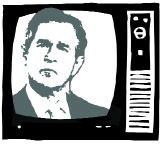WE DIDN’T REALIZE it then, but when I last embarked on a column like this—on media, politics, popular culture, and the things they do to each other—times were kinder, gentler, and flusher, especially for those who make a business out of filling or pretending to fill the public’s need to know. Frank Blethen took my calls then and chatted amiably about his family’s mother ship, The Seattle Times. Now he punts calls to Kerry Coughlin, once a news shooter at the Seattle P-I and, briefly, Seattle Weekly, now the Times’ voice to the world in a world where newspapers have designated corporate voices.
I wanted to ask Blethen a simple question following last week’s repeal of the estate tax, against which he’d waged a jihad on the grounds it could force his family to sell the paper: Did this mean they wouldn’t sell? Coughlin replied circumspectly: “The Blethen family has no intention of selling the paper. It never has. Certainly that’s no less so now than it was before.” Feel reassured?
TOP TO ALMOST BOTTOM, it’s been a dismal season for los media, ink-stained and electronic. The most revered and most profitable newspapers are copying the dot-coms, laying off people like ships dumping ballast; last Tuesday’s New York Times details the latest slashing at Knight Ridder, once the white knight of big chains. Opinion polls place journalists just above slugs and siding salesmen (but below lawyers, congressmen, and most other professions) in prestige. A new Pew poll, in this month’s Columbia Journalism Review, finds that only 24 to 38 percent of Americans respectively think the media get facts straight, care about those they cover, protect democracy, and are “moral.” The share who thinks they “lack professionalism” has tripled.
But whaddaya expect, after all the dog-pack lathering over Tonya and Nancy, O.J. and Nicole, Monica and Bill? Consider all the ways (most of them unthinking) that ink and, especially, broadcast helped Bush II get his job and “mandate.” Sound bite coverage caught his “populist” charm, not his harsh, mindless, plutocratic ideology. Softball-pitching debate host Jim Lehrer let Dubya skate on nearly every issue. The prevailing shorthand misrepresented Boy George and Weird Al as equally coddled dynastic dauphins. Bush’s first cousin John Ellis, chief election handicapper for Rupert Murdoch’s right-wing Fox, stampeded the networks into miscalling Florida for W., coloring expectations in the subsequent recounts. The clamoring camera corps forced Dade County to abandon its recount. Almost everyone swallowed Bushie fabrications about Clinton and Co. looting and vandalizing the White House, and then buried the General Accounting Office’s finding that it was a bum rap. The papers that recounted the Florida votes reported only their Bush-friendly, not their Gore-friendly, findings.
Meanwhile, 60 Minutes’ ratings sank from top to middling, and CBS’ new flagship, and the new definer of televised “reality,” was the high school-clique drama Survivor. Howard Stern finally got on Seattle’s air and no one noticed; the world is full of Howard Sterns now.
With so much fear and loathing stalking the profession, the only way to be more loathed is to write about it—to be the skunk at the media picnic, a pariah among pariahs. Like it or not, no institution needs a hard look and a good poke in the right places more than the one that delivers these to everyone else. Gosh, it’s nice to be back.
JENNAGATE. Are the Bush daughters getting overcovered? I thought so at first: Kids will be kids, and they deserve privacy. But they’re adults who apparently broke the law—for impersonation, not just drinking. Their repeated recklessness, recalling Dad’s own past boozin’ and denyin’ (versus his current hang-’em-high policies), may say more about him than Brer Billy’s and Brer Roger’s much-covered binges said about their presidential kin.
STOLEN MEMORIES. The Times is smarting over Joel Connelly’s recent P-I column that lashed the paper for shedding crocodile tears after not reinstating “union activist” Emmett Watson after the strike and before his death. Times spokesperson Kerry Coughlin says Watson was called back—but not till April, when he was too sick—and that the Times fought to protect his COBRA coverage. Neither the Times nor Connelly noted that Watson bravely opposed the papers’ 1981 joint operating agreement in print and deed; he recruited his buddy Bill Dwyer to fight it. Two years later the P-I cut his column back, and he jumped to the “Brand X paper”; he nearly went to the Weekly, but it could only offer one column a week.








